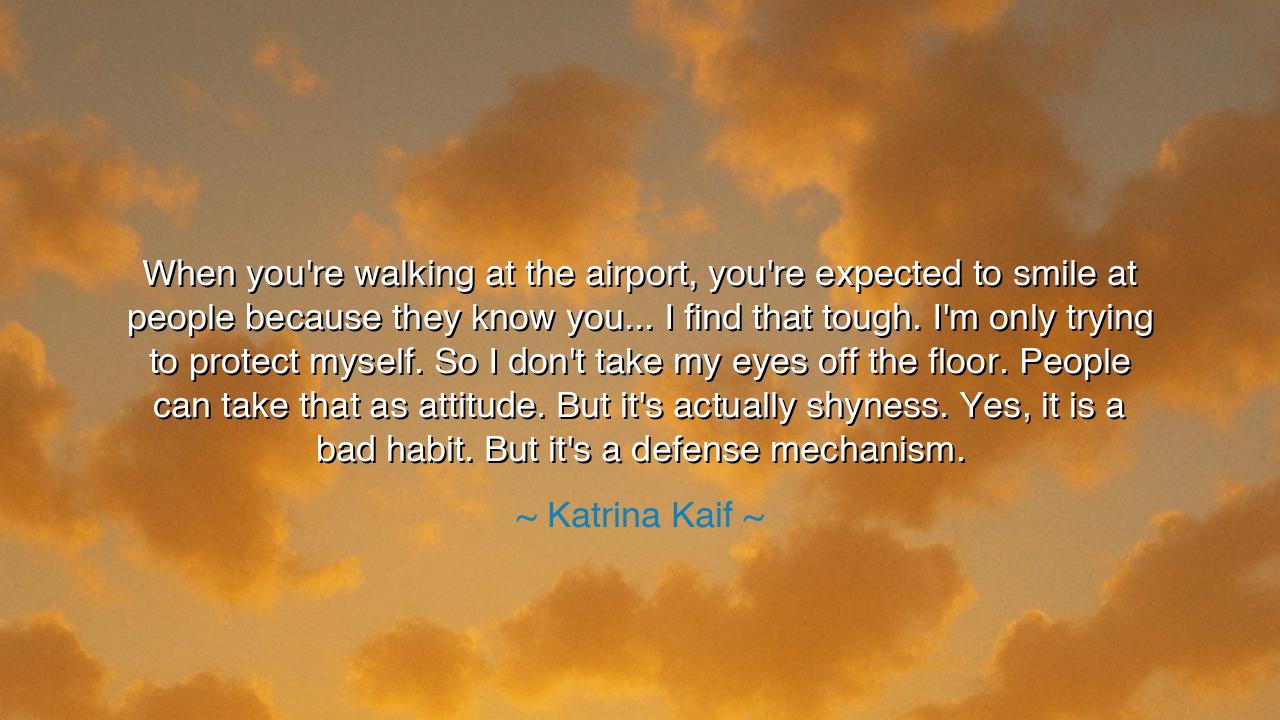
When you're walking at the airport, you're expected to smile at
When you're walking at the airport, you're expected to smile at people because they know you... I find that tough. I'm only trying to protect myself. So I don't take my eyes off the floor. People can take that as attitude. But it's actually shyness. Yes, it is a bad habit. But it's a defense mechanism.






Host: The airport was a symphony of voices, announcements, and the rhythmic wheels of suitcases rolling across polished floors. The ceiling lights hummed above like an artificial sky, too bright, too even, too awake. Glass walls reflected the world in fragments — faces, lights, motion — all blurring into something impersonal and infinite.
Through this world of movement, Jack and Jeeny walked side by side. He carried a worn duffel bag, his grey eyes sharp but distant. She had a small book tucked under her arm, her hair loose and slightly tangled from the wind outside.
Host: They found a small corner café overlooking the runway, where planes taxied like restless dreams. The smell of espresso mingled with the sterile air-conditioning, a strange mix of warmth and isolation.
Jeeny broke the silence first, her voice soft but certain.
Jeeny: “Katrina Kaif once said, ‘When you’re walking at the airport, you’re expected to smile at people because they know you… I find that tough. I’m only trying to protect myself. So I don’t take my eyes off the floor. People can take that as attitude. But it’s actually shyness. Yes, it’s a bad habit. But it’s a defense mechanism.’”
Host: Jack’s brows furrowed slightly, his finger tracing the edge of his cup.
Jack: “Defense mechanism… that’s honest. I like that. At least she’s not pretending to be what the world wants.”
Jeeny: “But don’t you see the sadness in it? To be known by everyone and still have to hide behind the floor?”
Jack: “It’s not sadness. It’s survival. The world worships visibility — but it devours privacy. Sometimes looking down is the only way to stay human.”
Host: The glass beside them trembled as a plane thundered past, the sound like a moving heartbeat through metal and distance.
Jeeny: “You really think isolation protects anyone? You call it survival, but isn’t it just fear wearing a rational face?”
Jack: “Fear is rational, Jeeny. When the world keeps staring, you learn to lower your eyes. It’s like armor. People see arrogance, but it’s really self-preservation.”
Host: His voice carried that low, husky gravity — the tone of someone who had built fortresses out of silence.
Jeeny: “But hiding becomes habit, Jack. And habits build walls. Don’t you think we lose something of ourselves behind that armor?”
Jack: “We lose exhaustion, maybe. We lose intrusion. You know how many people confuse access with intimacy? They want to see everything — your smile, your fear, your failure — and call it connection. Sometimes the only control you have left is where you look.”
Jeeny: “That’s tragic.”
Jack: “No. That’s peace.”
Host: The coffee machine hissed in the background, filling the pause like a breath between their words.
Jeeny: “But peace built on retreat isn’t peace. It’s surrender. Katrina wasn’t wrong to protect herself, but she also called it a ‘bad habit.’ Somewhere she knows — defense can become a prison.”
Jack: “Maybe. But we all have prisons we decorate. Some call theirs confidence; others call it shyness. The trick is finding one that doesn’t collapse on you.”
Jeeny: “You sound like you’ve lived in one.”
Jack: “We all do. I just learned not to put windows in mine.”
Host: Jeeny’s eyes softened. The airport lights reflected faintly in them, like tiny suns flickering with empathy.
Jeeny: “You know, I think people misunderstand shyness. It’s not arrogance, not vanity — it’s sensitivity. You feel too much, so you guard the gates.”
Jack: “Exactly. The louder the world gets, the more dangerous openness becomes.”
Jeeny: “But don’t you think we were meant to be seen? Not just looked at — but seen? Maybe that’s what she struggles with. The difference between the two.”
Jack: “You think fame can allow that difference?”
Jeeny: “Not fame. Humanity. You can be famous and still human, if you’re brave enough to stay soft.”
Host: The airport intercom crackled overhead, announcing a departure, the kind that sounded both urgent and indifferent. Around them, people moved in waves — families, businessmen, backpackers — all wearing the same look of contained fatigue.
Jack: “Softness gets crushed in crowds like this.”
Jeeny: “Not if you carry it differently. Shyness isn’t weakness; it’s awareness. Maybe looking at the floor isn’t shame — maybe it’s humility in disguise.”
Jack: “Or fear.”
Jeeny: “Or protection until you’re ready to trust again.”
Host: She spoke the word trust softly, as if it might break if said too loud.
Jack: “You think it’s that simple? That we can just trust again? People betray, judge, twist your quiet into arrogance — just like she said. The moment you stop performing, you’re labeled difficult.”
Jeeny: “Yes. But the moment you start performing for survival, you lose the self you’re trying to protect. It’s a paradox, Jack. You can’t defend what you hide forever.”
Host: The rain began to fall outside the terminal, streaking the glass with thin silver lines. For a moment, the planes seemed to float through the storm, their lights






AAdministratorAdministrator
Welcome, honored guests. Please leave a comment, we will respond soon